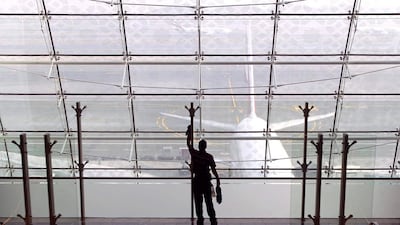Meshari Al Bannai stands on a stage before dozens of Emirati delegates. He recalls a visit to Nasa, where an adviser asked a busy cleaner what he was doing. The cleaner replied: “I’m not cleaning the ground or the floor, but helping us to reach the moon.” Mr Al Bannai, the human resources vice president at Dubai Airports, gestures and clarifies: “The communication was so strong that this cleaner knew the objectives and strategy of the establishment.”
This month, human resources experts and managers from both the private and public sector met at the Federal Authority for Government Human Resources International Forum to discuss the strategic role of HR.
Although the UAE does not count reaching the moon as one of its goals, it does have bold aspirations. Space flight is not off the cards, with Abu Dhabi set to become a launch pad for Virgin Galactic flights, However, larger socio-economic ambitions, such as Abu Dhabi Vision 2030 and Dubai’s preparation for Expo 2020, will require huge amounts of investment and planning.
Robert Hanna, regional director at the professional training company Morgan International, says such significant dreams and vision are commendable, but cannot be realised without an action plan and proper application of human resources.
“It goes back to people, to the sustainability of those people, to the engagement they have in the society, the skills they have and the confidence they want to have,” says Mr Hanna. “The dependence on those people is very important to the economy actually.”
However, he adds, there is a positive trend in the UAE, with increasing numbers of public authorities and ministries striving towards more efficient and productive human resources departments.
“Human resources is becoming more and more recognised as a strategic arm of the organisation, and not only administrative. We see a lot of people going through training programmes, sometimes even on their own – without sponsorship.
“I think there are tremendous opportunities in this region. Human resources were limited at a certain period of time but now everybody is aware that without proper HR, the economy will not grow further.”
Both the private and public sectors, he adds, are putting increasing effort into finding the right people and maintaining them. “The people who are coming to our classes are increasing because there’s no way that if an economy, that is in any way developing, doesn’t develop with the people they have, I think they will be in trouble.”
Mr Al Bannai also touches upon this point. With Dubai International Airport’s 5.6 million passengers overtaking London Heathrow’s 4.9 million in February this year, Mr Al Bannai speaks from experience. Given that tourism’s contribution to the UAE’s GDP is expected to rise to Dh277.8 billion by 2022, 14.6 per cent of GDP, the country’s airports will continue to play a significant role in the country’s economy. Managing such large-scale operations can be a challenge without engaged and satisfied employees, says Mr Al Bannai.
“Changes are becoming more and more frequent and … the companies who don’t do the best they can [to adapt] will lose their talents in the future.”
He adds that Dubai Airports uses a variety of methods to maximise employee engagement, and thereby build an effective performance culture.
The company’s performance management system, for example, begins by identifying objectives, strengths and weaknesses and culminates in a review measuring how well employees have achieved their goals – on a scale from one to five.
“We don’t want [staff] to see them as random, and for punishment,” explains Mr Al Bannai. “We give the details so the employee feels this is for their advantage.”
The company also organises activities such as talent shows and sports matches to bring staff closer and encourage the “spirit of teamwork”.
He adds: “And we revise these mechanisms on an annual basis through listening to people. We use engagement surveys – our target is 75 per cent feedback, but sometimes we get more.”
Follow us on Twitter @Ind_Insights

